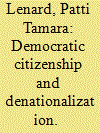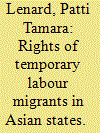|
|
|
Sort Order |
|
|
|
Items / Page
|
|
|
|
|
|
|
| Srl | Item |
| 1 |
ID:
178974


|
|
|
|
|
| Summary/Abstract |
Democratic citizens confront a range of problems framed as “security” issues, in policy areas such as counterterrorism and migration control, which place substantial political pressure on democratic norms. We develop a normative theoretical framework for assessing whether and how policies that curtail democratic governance standards in the name of security can be justified as politically legitimate. To do so, we articulate a novel normative account of legitimacy, which integrates insights from both democratic and realist traditions of thought to illuminate the complementary contributions of democratic and security standards to political legitimacy. We further elaborate a framework for applying this theoretical account to political practice in the form of a policy-focused “security test” for legitimacy in democratic states. Finally, we explore how this test may be deployed to help resolve policy dilemmas in democratic practice, by examining its application to a case study of national policy on irregular boat arrivals in Australia and Canada. Through this analysis, we contribute to the development of both richer theoretical understandings of the complex modern value of political legitimacy, and clearer action-guiding principles for balancing competing demands of legitimacy within securitized democratic policy regimes.
|
|
|
|
|
|
|
|
|
|
|
|
|
|
|
|
| 2 |
ID:
158489


|
|
|
|
|
| Summary/Abstract |
Are democratic states permitted to denationalize citizens, in particular those whom they believe pose dangers to the physical safety of others? In this article, I argue that they are not. The power to denationalize citizens—that is, to revoke citizenship—is one that many states have historically claimed for themselves, but which has largely been in disuse in the last several decades. Recent terrorist events have, however, prompted scholars and political actors to reconsider the role that denationalization can and perhaps should play in democratic states, in particular with respect to its role in protecting national security and in supporting the global fight against terror more generally. In this article, my objective is to show that denationalization laws have no place in democratic states. To understand why, I propose examining the foundations of the right of citizenship, which lie, I shall argue, in the very strong interests that individuals have in security of residence. I use this formulation of the right to respond to two broad clusters of arguments: (1) those that claim that it is justifiable to denationalize citizens who threaten to undermine the safety of citizens in a democratic state or the ability of a democratic state to function as a democratic state, and (2) those that claim that it is justifiable to denationalize dual citizens because they possess citizenship status in a second country that is also able to protect their rights.
|
|
|
|
|
|
|
|
|
|
|
|
|
|
|
|
| 3 |
ID:
129453


|
|
|
|
|
| Publication |
2014.
|
| Summary/Abstract |
This article considers the struggles faced by Asian states in their attempts to recruit mostly low-skilled temporary labour migrants. The article observes three trends: (1) there is a marked reluctance to admit low-skilled migrants into many Asian states, even where they are clearly needed; (2) where they are admitted, there is an associated marked reluctance to grant them an expansive set of rights, including in particular a path to citizenship; and (3) there continues to be a concern to protect the cultural basis of the nation, which serves as justification for both the reluctance to admit migrant workers and the reluctance to extend them rights. As a result of these three trends, two observations can be made. First, the presence of increasing numbers of both high- and low-skilled migrants may force Asian states to reconsider their reliance on ethno-national self-definitions. Second, however, to the extent that this reconsideration is already transpiring, it is not yet easily translating into more and better rights for, especially, low-skilled migrants, in particular with respect to the rights associated with citizenship status. The worry that migrants threaten social cohesion in Asian states, by sullying the national 'brand', prevails
|
|
|
|
|
|
|
|
|
|
|
|
|
|
|
|
|
|
|
|
|